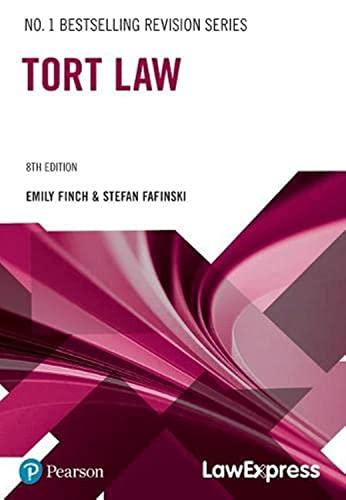Question
1.Gregory enters into a contract with Harry in which Harry will renovate Gregory's house. They enter into the contract on July 1 and the contract
1.Gregory enters into a contract with Harry in which Harry will renovate Gregory's house. They enter into the contract on July 1 and the contract states that it is vital that the work be completed by July 31. Harry does an excellent job but doesn't complete the job until August 14. Due to the delay Gregory had to postpone a big party he was going to have in his house on August 2. It cost Gregory $25,000 to reschedule the party. Gregory sues harry for damages. Will Gregory be successful? What if the contract just had the July 31 completion date but never stated that it was vital and it was customary for these type of jobs to not be completed on time. Would the result change?
2.Mary enters into an agreement to sell 3 cases of vintage wines at $1,500 per bottle to Audrey. Mark offers to pay Mary $2,500 per bottle. Mary calls Audrey to cancel the contract. If you were Audrey's attorney what would you advise her to do?
3.Is the contract in question 2 the type of contract that usually contains a liquidated damages clause? Why or why not?
4.Why are exculpatory clauses upheld in skydiving contracts but not in contracts for hip replacements?
5.Give an example of tangible personal property, choses in action and intangible property.
6.What is the difference between title and possession?
7.When is a gift complete? Once completed can the donor take back the gift?
8.A and B own property jointly as tenants in common. Each owns 50% of the property. A dies. Who is entitled to A's share of the property?
9.Mark and Audrey are married and both in their 60's. They have $1 million in a securities account as joint tenants with rights of survivorship. Mark starts to date Stephanie, a 20 year old woman. He gives Stephanie his interest in the account as a gift.Five years later, Audrey dies. Stephanie and Audrey's sole surviving heir Joanne claim Audrey's share of the account. Who wins and what are the policy reasons behind the controlling rule?
10.A and B are married and own property as tenants by the entirety. The property is worth $500,000. A incurs a debt of $100,000 and can't repay the debt. Can the creditor go after A's share of the property to collect the debt? If so, why? If not, why not?
11.Give an example of a bailment.
12.It is said that the relationship between the bailee and bailor is contractual but legal actions by the bailor against the bailee are usually based in torts. Explain what this means and give an example.
13.If a bailee sells the goods that it has received from the bailor, what are the rights that the buyer of the property obtains?
14.There are different levels of care that a bailee must use depending on who is receiving the benefit of the bailment. Give an example showing the different levels of care required.
15.Many parking lots will document any dents or scratches on a car before they accept the car. Why do they do this? What is the legal status of the parking lot and the owner of the car in this relationship? Whose benefit is the relationship for?
Step by Step Solution
There are 3 Steps involved in it
Step: 1

Get Instant Access to Expert-Tailored Solutions
See step-by-step solutions with expert insights and AI powered tools for academic success
Step: 2

Step: 3

Ace Your Homework with AI
Get the answers you need in no time with our AI-driven, step-by-step assistance
Get Started


